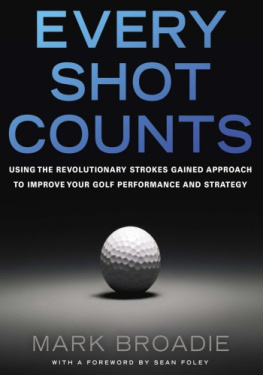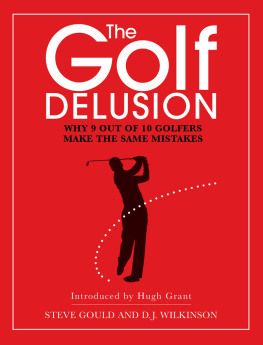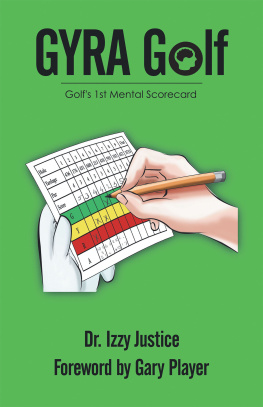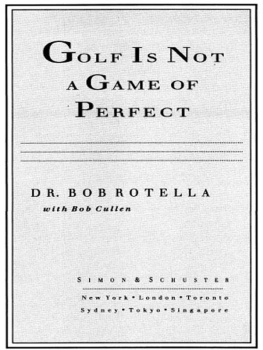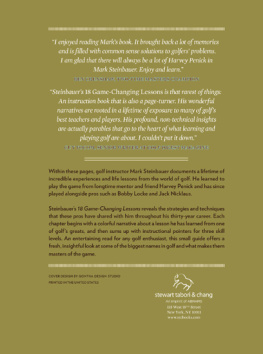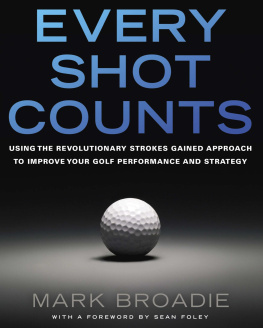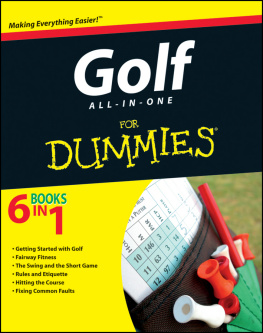GOTHAM BOOKS
Published by the Penguin Group
Penguin Group (USA) LLC
375 Hudson Street
New York, New York 10014

USA | Canada | UK | Ireland | Australia | New Zealand | India | South Africa | China
penguin.com
A Penguin Random House Company
Copyright 2014 by Mark Broadie
Penguin supports copyright. Copyright fuels creativity, encourages diverse voices, promotes free speech, and creates a vibrant culture. Thank you for buying an authorized edition of this book and for complying with copyright laws by not reproducing, scanning, or distributing any part of it in any form without permission. You are supporting writers and allowing Penguin to continue to publish books for every reader.
constitutes as an extension of the copyright page.
Gotham Books and the skyscraper logo are trademarks of Penguin Group (USA) LLC.
LIBRARY OF CONGRESS CATALOGING-IN-PUBLICATION DATA
Broadie, Mark Nathan.
Every shot counts : using the revolutionary strokes gained approach to improve your golf performance and strategy / Mark Broadie.
pages cm
ISBN 978-0-698-13859-9
1. Swing (Golf) 2. GolfStatistical methods. I. Title.
GV979.S9B76 2014
796.3523dc23
2013037178
While the author has made every effort to provide accurate telephone numbers, Internet addresses, and other contact information at the time of publication, neither the publisher nor the author assumes any responsibility for errors or for changes that occur after publication. Further, the publisher does not have any control over and does not assume any responsibility for author or third-party websites or their content.
Version_2
To Nancy, Christopher, and Daniel, who all liked foozled
CONTENTS
FOREWORD
SEAN FOLEY
Coach of Hunter Mahan, Edoardo Molinari, Justin Rose, Lee Westwood, Tiger Woods, and other PGA Tour pros
T he first time I became familiar with Mark Broadies work was when I browsed the PGA Tour website one day and saw this thing that said Strokes Gained Putting. Golf isnt a team sport, its an individual sport, so using statistics to help improve a players perception of himself, or to figure out what he needs to spend time working on, was fascinating. Using these stats, we see how a guy putted today, and how it helped him gain or lose strokes against his competitors. I thought: This is kind of a noble idea.
My next step was to wonder if the numbers could be used to evaluate driving and iron play. It wasnt long until I reached out to Mark. Im not really a math guy, but as he sent me the strokes gained stats, I started noticing a massive difference. A guy could be number one in total driving, when under Broadies strokes gained driving he is number 27. At first I thought that was strange, but then it was obvious: The stats showed that the old adage drive for show, putt for dough just isnt true when it comes down to these guys earning revenue.
The thing is that the math doesnt lie. Strokes gained driving shows that distance is more valuable than accuracy. You look at strokes gained driving, look at the top five guys, and the one thing they all have in common is that they bomb it. They hit it forever. Sometimes these guys dont hit many fairways. Obviously their misses are going to be exaggerated compared to a guy with a slower swing speed. Still, Bubba Watson or Dustin Johnson or Tiger Woods or Rory McIlroy coming out of the rough with a 9-iron, they have an advantage over most players hitting a 5-iron out of the fairway, because theyre closer to the hole.
Wed always been taught that the important thing is hitting it in the fairway and hitting it on the green, but my intuition had told me long iron shots were important. Everyones always telling me, Your guys should be practicing a lot more wedges, but I just dont see them hitting many 80-yard wedge shots in a round. Ive always wanted my guys practicing a lot of 190- to 230-yard shots. And here were the strokes gained numbers to support that.
It becomes obvious how important it is to spend your time in the right place. Typically its easy to practice what you like and what youre good at. Im not against working on your strength, because if something is a strength you want to keep it that way. But its also important to work on your weakness. In the past, guys would fight me on that, but its tough to resist when you see the numbers right out in front of you.
The numbers approach also helps me tell my guys, Look, youre in this to win tournaments, youre in this to earn money, so you need to use more of your time doing what the numbers say you need to work on, not just whatever you feel like doing. And they have to agree. They see the numbers and theyre just, like, Yeah, I get it.
Another way it works is psychological. Justin Rose once told me, My wedge play has to get better. Im not happy with it, we have to work more on it. I said, Thats funny, because Mark Broadie has you as number one on the PGA Tour in wedge play. As soon as he saw that, he played with more confidence, standing over a shot thinking, Man, Im the best, this is a great opportunity, rather than, Im not really comfortable with this.
Theres not a psychologist in the world who could do a better job convincing a guy that hes good than those numbers. They are just too reasonable, theres too much logic.
Im going to lift every rock possible to figure out how to maximize these guys earnings and world rankings, and thats why I value Marks information. Because why would I guess about what I can measure? So much of what we believe in life comes from what weve been told over and over, and we never really question it. The value of the numbers approach for a coach is that its not belief, its fact.
Traditional golf stats today are like a plane thats circling the airport until it runs out of gas. Its going to either land or crash. People are in a comfort zone, and theyre not willing to go through the pain or doubt that goes with developing a new way of thinking. But at some point, Marks approach will become how people determine golf performance. Theyre just going to have to accept it, because it makes too much sense.
This approach gives me an opportunity to help guys become better players. On the PGA Tour Ive watched guys spend hours practicing skills that are just 6% of their score, whereas my guys are on the range hitting 4-irons until their hands bleed. Even with the young kids I coach, our goal has become smashing it as hard as we can. Ive changed them to workouts that do more for acquisition of power and velocity than what Id previously done. If the kids can hit it far, they can learn to hit it straight later.
Mark Broadies findings are very important to competitive players, more than anyone even understands yet. My getting a guy to make a little change in his technique is going to have less effect than getting him to recognize the truth in the numbers in front of him. For people who want to become better golfers, and for young golfers and college players, even if it flies in the face of what theyve been taught, the numbers approach is the way to go.
INTRODUCTION
H ow do you make your golf decisions? Many of us stand over the ball and decide based on our feelings at the moment. Feeling confident: Go for the pin. Made a mess of the last hole: Play it safe. Our decisions are often made on hunches. But what if you could base your decisions on something more convincing, on data and solid analysis? As Charles Dickens wrote in Great Expectations : Take nothing on its looks; take everything on evidence. Theres no better rule.
As golfers, we often make poor decisions. We decide to thread our ball through a narrow opening only to see our shot ricochet deeper into the woods. We attack a pin only to see our hopes of a birdie vanish as the ball settles into a bad lie in the bunker. In many situations its not easy to tell a good decision from a bad one. Is it better to lay up to a comfortable distance of 90 or 100 yards or to hit it farther, leaving 20 or 30 yards to the hole? On a five-foot breaking putt, is it better to die it in the hole, or jam it to take away most of the break?
Next page
